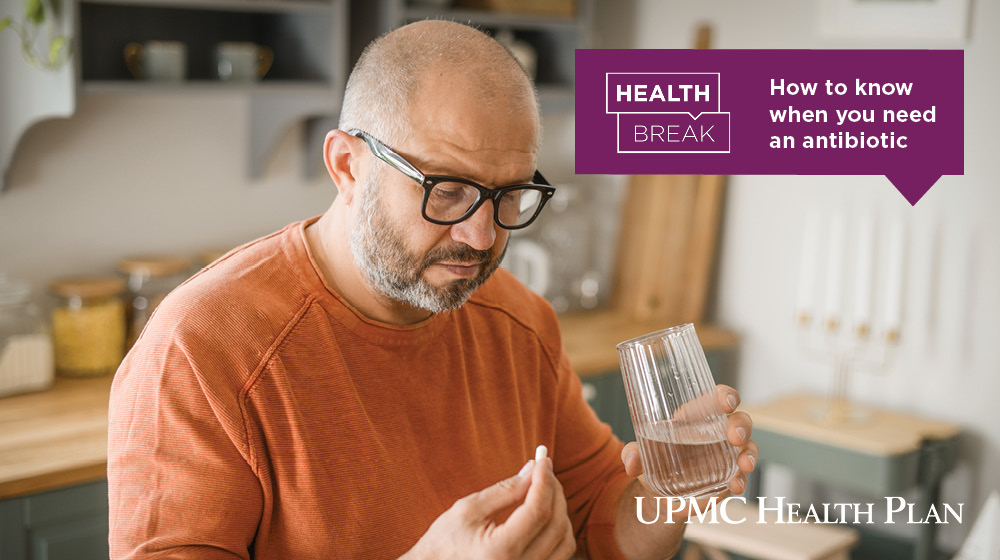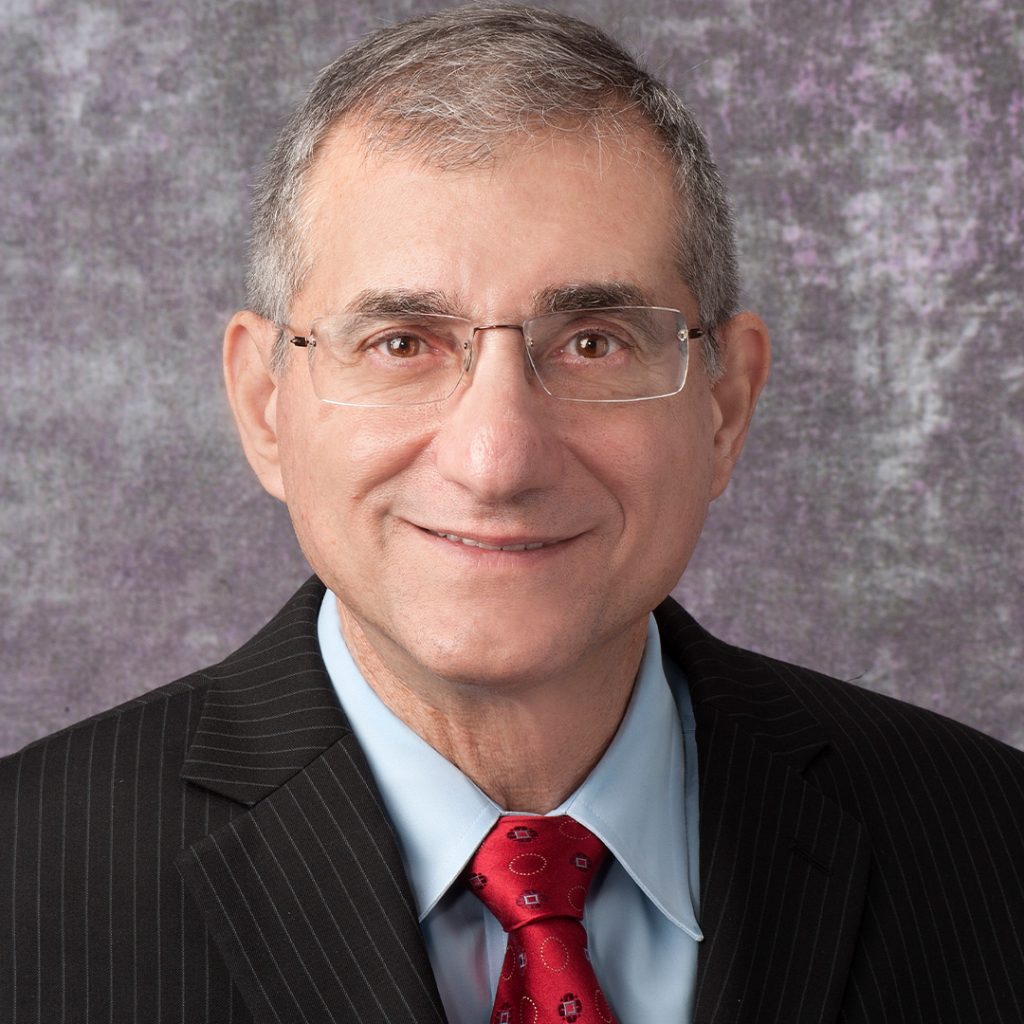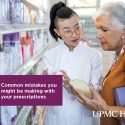Health Break: How to know when you need an antibiotic

A podcast for UPMC Health Plan members, Health Break is your quick guide to caring for your mental and physical health, prioritizing wellness, and making the most of your health insurance plan.
Episode 17: Take a Health Break with Dr. Nick DeGregorio
Dr. DeGregorio takes a Health Break to discuss all things antibiotics: Why they’re different from other medications, how to know when you should and shouldn’t be taking them, how to take them correctly and safely, and how to avoid antibiotic resistance.
Episode transcript:
Camille: Welcome to Health Break by UPMC Health Plan, your quick guide to health, wellness, and how to make the most of your health insurance plan. Listen during your coffee break, lunch break, or anytime you need a break. I’m your host, Dr. Camille Clarke-Smith. I help to oversee the quality of the plans we offer at UPMC Health Plan.
Alex: And I’m your co-host, Alex Treanor. I’m a senior health coach who works with our members on healthy lifestyle habits and goals. This is your… Health Break.
Camille: Hey everyone! Dr. Camille Clarke-Smith here. Today we have back with us Dr. Nick DeGregorio and he’s going to walk us through how to determine whether you need an antibiotic and best practices for using antibiotics correctly and safely.
Thank you so much, Dr. Nick, for being with us today.
We want to know, how are antibiotics different from other medications?
Dr. DeGregorio: Well, antibiotics treat only certain types of infections—those caused by bacteria—and some antibiotics can kill the bacteria directly. Others just inhibit the growth of the bacteria to allow your own immune system to kill them. Antibiotics don’t work on viruses, and that’s really the most important distinction. It’s important not to use antibiotics for viral infections. First of all, they don’t work. Second, they can cause significant side effects. And third, when we use antibiotics unnecessarily, that can cause bacteria to become resistant to the antibiotics. Mainly, viruses have to run their course. Studies have shown that up to a third of all antibiotics prescribed are really not necessary, and about one in five emergency department visits are due to an adverse reaction to an antibiotic.
Camille: When we talk about viruses, how can we tell when an illness is viral versus bacterial?
Dr. DeGregorio: Yeah, and that’s something that patients commonly ask. It has to do mostly with the type of infection, and how it presents. Most colds and flus and upper respiratory infections are caused by viruses. Some infections may be caused by a virus or bacteria, and it’s difficult to identify early in the course—things such as earaches or sinusitis. So if it’s not apparent at the beginning, your doctor might use what it’s called watchful waiting or delayed prescribing. They might wait a period of time, you know, five days or seven days, to see if the symptoms get better, or if they’re getting worse, before considering using an antibiotic. And you know, if after so many days, you’re not feeling better or getting worse, or you have a high fever, they definitely would want to re-evaluate and determine if an antibiotic is needed.
Camille: What are some scenarios where antibiotics are appropriate, and where are they not?
Dr. DeGregorio: Again, I think common conditions like strep throat (which we confirm by getting a throat culture to distinguish it from a viral infection in the throat), things like whooping cough and pneumonia that are caused by bacteria or urinary tract infections—those will commonly require treatment with an antibiotic. Things that really we should not use antibiotics for and try to avoid them are for things like cold or runny nose, the majority of sore throats that are viral, the flu, and most kinds of chest colds and seasonal allergies and coughs that are caused by asthma. And I think something people have on their minds today is COVID-19. That’s a viral infection, so it’s important to recognize that antibiotics won’t work for that. Fortunately, newer therapeutics are being developed that do treat COVID-19. And of course, you know, we’re encouraging immunization to prevent that infection.
Camille: When we’re trying to sort out when we might need an antibiotic, are there any resources to help determine what type of treatment is appropriate?
Dr. DeGregorio: Yeah, and we often get questions from patients about that. First and foremost, we recommend people use their primary care physician as a resource whenever they feel ill to call them and see if they can get an appointment or if the doctor feels they need additional testing. The other options, if your primary care doctor isn’t available, is UPMC has what’s called AnywhereCare. That’s a virtual urgent care platform that allows you to call right through your smartphone or your computer or tablet. You can see the doctor and talk to the doctor directly about your symptoms. It’s available any time that’s convenient for you without needing to arrange transportation or childcare, so it’s a wonderful service. And another resource—UPMC Health Plan has a 24-hour-a-day, seven-day-a-week Nurse Line, and you can call the nurse at any time to talk about your symptoms and to get their perspective on whether you need to see your doctor, whether you need to go to the emergency room, or maybe whether you just need some reassurance about your symptoms.
Camille: If a doctor does prescribe an antibiotic, how can we be sure that we are using them correctly?
Dr. DeGregorio: The important thing is to use the antibiotics as prescribed. There can be significant consequences when you don’t. Antibiotic therapy should only be used when necessary and only for the recommended duration. Taking antibiotics for too long or stopping them too early can lead to antibiotic resistance—and when I say antibiotic resistance, that’s really where, you know, with continued exposure to antibiotics, bacteria can sort of change and mutate, and then they can develop changes that make that antibiotic no longer effective against them. So that’s an important thing for all of us. And I think, you know, we’re all in health care together. The providers and the patients are a team. So really as a team, we think about antibiotic stewardship and making sure we use them when we need them so that they work and, you know, trying to use them responsibly. So when we think it’s really more of a viral infection, we tend not to use them. And I think by doing that, it really helps us to stay healthy as a community.
Camille: One last question for you, Dr. Nick. If you had to let us know one great thing to remember about antibiotics, what would that be?
Dr. DeGregorio: I think the important thing is, when you think you might need an antibiotic, check with your doctor, do a virtual urgent care visit, call the Nurse Line, and talk about your symptoms. Again, if the general thought is it’s a viral, we would [want] to think about not using an antibiotic and other supportive symptoms as recommended by the doctor, but when it’s a bacterial infection, then yes, we want to use an antibiotic and use it as prescribed for the recommended amount of time.
Camille: Thank you so much, Dr. Nick, for taking a Health Break with us today.
Dr. DeGregorio: Thank you.
Camille: Talk to your doctor about antibiotic usage, and learn more about when you do and don’t need an antibiotic by visiting the show notes.
Find show notes and more information at upmchealthplan.com/podcast. Join us as we explore other health and wellness topics in the next episode of Health Break.
This podcast is for informational and educational purposes. It is not medical care or advice. Individuals in need of medical care should consult their personal care provider. Views and opinions expressed by the hosts and guests are solely their own and do not necessarily reflect those of UPMC Health Plan and its employees.
Related to this episode:
About Dr. Nick DeGregorio:

Dr. Nicholas DeGregorio is an internal medicine physician currently serving as the senior medical director for UPMC for You, a Medicaid Managed Care Organization affiliate of UPMC Health Plan. Dr. DeGregorio completed his medical school training at the University of Cincinnati School of Medicine, an Internal Medicine Internship and Residency program at the University of Pittsburgh, and a Master of Medical Management degree from Carnegie Mellon University. Additional areas of interest and support he provides at UPMC Health Plan include provider credentialing, quality improvement, patient-centered medical home, value-based reimbursement, opioid use disorder, overdose prevention, opioid use disorder in pregnancy, neonatal abstinence syndrome, and women’s health.
About Dr. Camille Clarke-Smith:

Camille Clarke-Smith, EdD, is a program director in the Quality Improvement, Medicare Stars Department at UPMC Health Plan, where she leads the Medicare Faith and Wellness Program, a 3- to 12-week health and wellness challenge. She is also the founder of the nonprofit Transforming the Health of African American Women (THAW) Inc. She earned a doctorate in health and physical activity education from the University of Pittsburgh in addition to a master’s in exercise science and a bachelor’s in psychology and sociology. She is currently pursuing her master’s degree in social work at Carlow University.
About Alex Treanor:

Alex Treanor is a lead health coach at UPMC Health Plan. As a lifestyle health coach, she specializes in helping you lose weight, eat healthy, get more physical activity, be less stressed, and quit tobacco. Alex has a master’s in Kinesiology, Integrative Wellness from Point Loma Nazarene University. She has been coaching since 2014 and is a Nationally Board Certified Health & Wellness Coach and Certified Personal Trainer. Alex is passionate about helping people improve their relationship with food and exercise while creating healthy, sustainable routines filled with enjoyment. Alex enjoys spending time with her husband, walking with her dog, and eating tacos in the sunshine.



